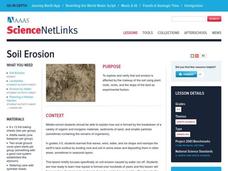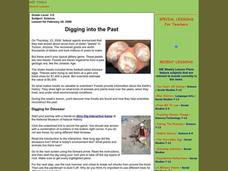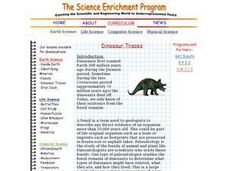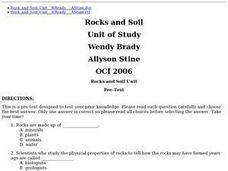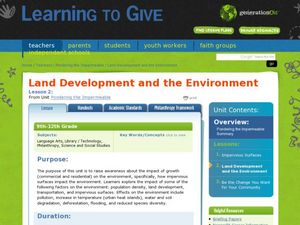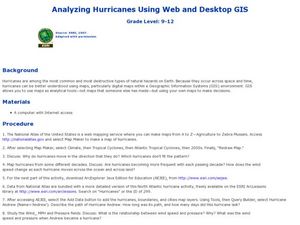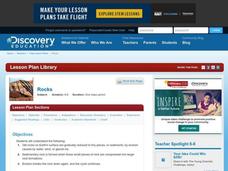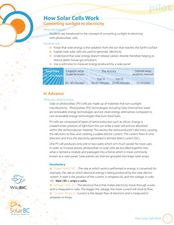Curated OER
Design an Island
Students explore islands. They create a two- or three-dimensional map of an island. They explain how the topography of an area influences the location of water sources, ecosystems, and human settlements. Lesson includes adaptations for...
Curated OER
Going...going...gone? Tropical Rainforests-How They Work, What They Do for Us, What's Being Done to Them...
Sixth graders explore the Tropical Rainforest and come to understand what it is and how it affects the ecosystem. In this rainforests lesson, 6th graders write about the Tropical Rainforest, imagine they are in the Tropical Rainforest,...
Curated OER
The Spectrum of a Star
Tenth graders identify stars based on their line spectra. In this astronomy lesson, 10th graders analyze spectrograph and determine the elements present in the star. They explain the relationship between temperature and star classes.
Curated OER
Capillary Action and Adhesion
Students perform classroom experiments to observe adhesion. They perform a second experiment using sand, salt, water, and a heat lamp to observe the principle of capillary action. They also experiment with adhesion in plants.
Curated OER
Tracking Ozone
Students track an ozone event in Groton, CT. They compare weather changes and the subsequent ozone levels. Also, they make comparisons and determinations about ozone levels.
Curated OER
Ozone Tag
Young scholars explain the role of stratospheric ozone and predict at least three ways in which depleted ozone would change her/his lifestyle. They then
describe the process by which chlorine or bromine compounds can break down ozone...
Curated OER
Soil Erosion
Students examine how erosion is affected by the composition of the soil and the slope of the land. They look at plant roots, rocks and land slope as experimental factors. They complete the associated worksheets before discussing their...
Curated OER
The Magic School Bus Out of This World
Students learn along with Ms. Frizzle's class. In this Magic School Bus lesson plan, students explore craters that objects of different sizes and weights (marbles, Ping-Pong balls, and aluminum foil balls) create.
Curated OER
Forest Canopies: View from the Top
Students examine the economic and ecological benefits of forest canopies. They read and discuss an article, answer questions, conduct research, draw field sketches of a canopy ecosystem, conduct a feasibility study, or prepare tourist...
Curated OER
Digging into the Past
Young scholars discover how fossils are found and how they help scientists reconstruct the past. They examine how they shed light on what kinds of animals and plants lived over the years, when they lived, and under what environmental...
Curated OER
Earthquakes
Students inspect the causes and effects of earthquakes and examine how seismic waves travel. For this earthquake lesson, students determine where earthquakes happen and why, before determining how to build an earthquake resistant...
Curated OER
Dinosaur Traces
Students identify and interpret the type of evidence found at a typical dinosaur dig and mimic a paleontologist by taking crayon rubbings of simulated bone impressions. After the rubbings are taken, the students reconstruct the complete...
Curated OER
MAPPING THE TOPOGRAPHY OF UNKNOWN SURFACES
Students describe in words and graphic displays the elevation or depression profile of sections of Mars' Olympus Mons and/or Valles Marineris. They explain how orbiting spacecraft build up global maps one data slice at a time.
Curated OER
Introduction to Coral Reefs
Students identify locations of coral reefs, both in the water and around the globe, identify relative depth of corals in the ocean by observing behavior of cold and warm saltwater, and create models of coral reefs.
Curated OER
Rocks and Soil
Students explore the physical properties of rocks. They explore the three different types of rocks and are able to compare and contrast their different properties. Students simulate the creation of sedimentary rock, they also...
Curated OER
Coal Derivatives
Students use this hands-on activity to demonstrate the production of coke, one of the most widely used raw materials derived from coal. They are also stimulated to do research into the differences in coal types and coal products.
Curated OER
Prokaryote Coloring
In this prokaryote worksheet, students answer ten questions about prokaryote cells and they color a diagram of a simple bacteria cell and its structures.
Center for Innovation
Air Pollution: What is the Solution?
For this air pollution worksheet, students use an online simulation called "Smog City" to manipulate different conditions that affect air pollution. Students answer questions about the health effects at peak ozone levels for different...
Curated OER
Land Development and the Environment
Students examine the relationship between land development and the environment. In this environmental stewardship instructional activity, students explore how population density, land development, transportation, and impervious surfaces...
Curated OER
Analyzing Hurricanes Using Web and Desktop GIS
Students analyze hurricanes. In hurricanes lesson, students use the Internet and GIS to analyze hurricanes. Students view the National Atlas of Maps to discuss the direction hurricanes move. Students study the wind and pressure fields to...
Curated OER
Rocks
Learners examine how sedimentary rocks are formed. In this rock lesson students research different rock formations and different types of rock.
Curated OER
How Solar Cells Work: Converting Sunlight to Electricity
Students examine how to convert sunlight to electricity. In this renewable energy sources lesson students explain how solar cells are used and use a voltmeter to measure the energy produced by a solar panel.
Curated OER
Wave Math
Students identify the different factors affecting the size and shape of ocean waves. For this math lesson, students calculate wave speed and wavelength given a mathematical formula.
Curated OER
Olympic Solar Energy
Students use cardboard and aluminum foil to construct a solar oven that concentrates enough sunlight to cook a hotdog. They review the history and use of solar energy in relation to the Olympics.








